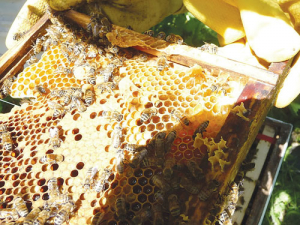Naki unveils the world’s most expensive manuka honey
Naki Honey, a New Zealand manuka apiary company, has crafted what is believed to be the world's most expensive honey.
 In the past decade or so, NZ’s beehive numbers have jumped from 300,000 to over a million on the back of the manuka honey hype, but many of the country’s beekeepers are now struggling to make any money.
In the past decade or so, NZ’s beehive numbers have jumped from 300,000 to over a million on the back of the manuka honey hype, but many of the country’s beekeepers are now struggling to make any money.
OPINION: Honey isn't the gold mine the media often sets it out to be.
It seems that nowadays, every few weeks, there is reference in the news media to honey as ‘liquid gold’, creating the impression that anybody with a few beehives is making a fortune.
However, you don’t have to scratch the surface much to find this is not all true. Much of this is due to the manuka honey ‘gold rush’.
Why is this?
Originally, New Zealand top-grade honey was based on South Island clover. The country’s bee population was about 300,000 hives spread proportionally 50/50 between the North and South Islands.
NZ produced about 1000 tons more than we consumed and this 1000-odd tons was exported at international prices, which also set the price that NZ packers paid local producers.
Ten or more years ago, Professor Peter Molan of Waikato University was researching natural medicines and found that a small percentage of pure manuka honey had medicinal properties. This started a frenzy and – with good marketing – it seemed all the world wanted manuka honey.
Suddenly honey (manuka) that was once low-priced was commanding prices of $20 - $200/kg. Our pasture honey, which was selling at $4 - $5/kg climbed to $12 - $14/kg in 2016, mainly owing to the practice of mixing it with manuka honey and selling it as manuka-blend
Then NZ’s hive numbers climbed to almost 1 million – many owned by international companies. Competition for sites became intense with many local beekeepers being overwhelmed by large numbers of other hives, or by dirty tricks such as having their hives poisoned, burnt or stolen.
Overseas buyers became disillusioned at the quality of the manuka honey they were receiving, to the point where they started to withdraw it from their shelves.
This prompted MPI to develop a scientific test to define the purity of manuka. Now any honey exported from NZ, labelled as ‘manuka’, must be stamped on the label or drum as complying with the MPI test.
This means that only pure, certified manuka can command a premium price and non-pure manuka is rated along with all other honeys as table-grade honey. This honey, which until the new MPI testing regime sold at $10-$14/kg, is virtually unsaleable. Prices now are $5-$7/kg, but the packers are not buying. I have even heard of sales at $3/kg by desperate beekeepers.
There would be thousands of tons of last season’s crop sitting in beekeepers’ honey houses unsold and we are now at the start of the new season’s production.
There are beekeepers who will only place hives to get rated manuka honey and will not place hives for pasture honey, as the prices offered make it unsustainable. The sad thing about this is that farmers are now encouraging beekeepers to place hives on their farms as they realise the importance of clover in view of the nitrogen caps being placed on them.
I believe the future of beekeeping will go back to pre-manuka days, when surplus honey will be purchased by overseas buyers at international prices and will set the price paid for table grade honeys.
While this will clear NZ stocks, it will not be at a price many producers today – particularly those who have recently come into the industry – will be happy with.
• John Wright is a beekeeper with 65 years’ experience, including 56 years exporting comb honey.
Could a breakthrough in fermentation create a new multi-million-dollar export market for shiitake mushroom extracts into China?
Meadow Fresh has created the world's first fantasy sports league powered by real cows.
This year, 'Foodie February' sees potatoes take the spotlight as one of New Zealand's most powerful and versatile food heroes.
A multi-cultural team is helping to establish one of New Zealand's largest plantings of premium eating grapes - while learning each other's languages and cultures along the way.
The World Wide Sires National All Day Breeds Best Youth Camp Best All Rounder plaudit has become family affair, with 2026 Paramount Cup winner Holly Williams following in her sister Zara's footsteps.
DairyNZ is giving New Zealand farmers a unique opportunity to gain hands-on governance and leadership experience within the dairy sector.

OPINION: Meanwhile, red blooded Northland politician Matua Shane Jones has provided one of the most telling quotes of the year…
OPINION: This old mutt has been around for a few years now and it seems these ‘once in 100-year’ weather…